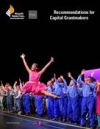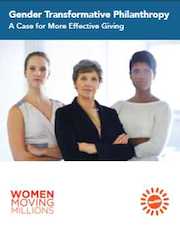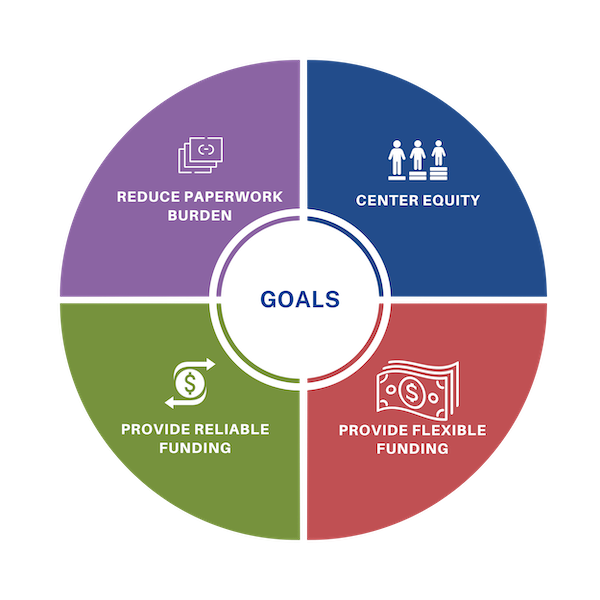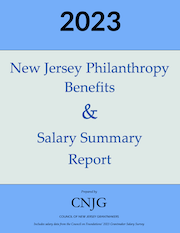Site Search
- resource provided by the Forum Network Knowledgebase.
Search Tip: Search with " " to find exact matches.


Attention to the role of gender is most useful with programs that seek to change unhealthy behaviors, such as reproductive health and teen pregnancy, gender-based violence, substance abuse and educational under-achievement. This guide suggests that funders can work to improve program outcomes by helping the funding community and grantees recognize how men and women are affected by disparities in social expectations, such as codes of manhood and womanhood.
In its most recent round of giving, the KearnyBank Foundation donated a total of $170,300 to five New Jersey-based charitable organizations.
“Our success enables us to help support those communities in which we conduct business, and we’re grateful for that,” says Craig Montanaro, Kearny Bank President and CEO. “And it’s gratifying that our contributions are made to a range of different organizations. I believe this variety ensures that a broader range of people will ultimately benefit from the funds we share.”
The Montclair Foundation (TMF) has awarded $65,000 in grant funding to 17 diverse nonprofits dedicated to making a positive difference in the Montclair community and its environs.
“We are proud to partner with these outstanding nonprofits to address the challenges and opportunities in our community,” said Peggy Deehan, Trustee and Grants Committee Chair. “We had over 30 applications, which was the most we’ve ever received. The grant review process was incredibly difficult because many worthy organizations applied.”
This position is responsible for developing programs that enhance and support the Corporate Social Responsibility team’s vision, strategic planning, financial management and funding operations that support the overall objectives of Horizon Blue Cross Blue Shield of New Jersey. This positon will oversee the Horizon Cares programs, Horizon’s internal platform of benefits that support employees’ charitable interests, to encourage employee engagement and maximize partnership opportunities and company reputation.
The Westfield Foundation is proud to announce that at their recent Board meeting, the Trustees awarded over $150,000 in grants, a historic high in both the number of applicants and the total dollar amount requested. These grants showcase the Westfield Foundation's steadfast dedication to nurturing a dynamic, supportive, and inclusive community. Through funding a wide range of initiatives, the Foundation seeks to meet pressing needs and enhance the overall well-being of all local residents.
A Framework for Change
The Doing Good Better Steering Committee encourages funders to focus on and advocate for four (4) changes that can make an immediate difference in addressing power dynamics between nonprofits and funders and maximizing nonprofit impact. These goals are aligned with Trust Based Philanthropy, and are interdependent; when combined, they foster equity and a spirit of mutual trust between grantmakers and nonprofit partners. For more details about a specific goal, click on its individual goal link below.
• Goal 1: Center Equity
• Goal 2: Provide Flexible Funding
• Goal 3: Provide Reliable Funding
• Goal 4: Reduce Paperwork Burden
Self-Assessment/Reflection Tool for Funders
Philanthropy and Nonprofits for Greater Impact: The “Doing Good Better” Blueprint Video
Summer EBT was created through legislation in December 2022 and states were given the option of launching the program in either the Summer of 2024 or 2025 or passing on the program altogether. This program provides $40 per month, every summer month, to every school age child that qualifies for free/reduced price meals. Hear from Mark Dinglasan, Executive Director, NJ Office of the Food Security Advocate (OFSA) and Nefeli Mourti, Senior Director, Social Strategy Associates to learn more about the data-sharing, outreach, and collaboration with the departments of Agriculture, Human Services, and Education to create this program.
The outreach committee has developed a Summer EBT tool kit which you can view here.
Cost: Free for CNJG Members; $50 for Non Member Grantmakers
Webinar Video
CNJG is pleased to offer this program to family foundation members as part of NCFP's Fundamentals of Family Philanthropy 2024 webinar series, providing guidance on the core tenets of effective family philanthropy.
This webinar will equip families with the knowledge and strategies needed to prepare the next generation to confidently take the helm and the current generation of leaders to feel secure in stepping back. By delving into engaging discussions and sharing practical insights, we’ll unravel the complexities of nurturing leadership skills, fostering a deep understanding of philanthropic values, and encouraging multi-generational collaboration within your family’s philanthropy.
Cost: This event is free for CNJG Members who are family foundations.
Other types of foundations are ineligible to join this webinar.
This program is a CNJG membership benefit for family foundation members, including staff and trustees, in partnership with the National Center for Family Philanthropy.
Part I: Supporting the social and emotional health of our communities
Join us as we begin a discussion on the trip back from COVID-19, and how we help to re-engage our teachers, students, and families after a two-year disruption. The first meeting will continue our exploration of the social and emotional toll of the pandemic and associated school closings, and ways that we might collaborate as a funder group on seeding solutions.
Panelists:
Jill Summers-Phillips, Principal at John F. Kennedy School
Positive Gunter - Parent
Yolanda Greene, Training Manager, Abbott Leadership Institute
Panel Facilitators:
Elizabeth Warner, President, SEL4NJ
Lauren Meehan, Facilitator – Director, Arts Ed Newark
Cost: Free for CNJG Members; $50 for Non Member Grantmakers.
Webinar Video
The FirstEnergy Foundation is supporting local communities as part of its Hunger Action Month initiative – awarding $600,000 in grants to 21 New Jersey food banks and pantries. In total, the initiative is granting $2.5 million to 104 hunger relief organizations across New Jersey, Maryland, Ohio, Pennsylvania, West Virginia and Virginia, marking the Foundation's largest hunger-relief investment to date.
The foundation's grants will provide approximately two million meals to families in communities served by Jersey Central Power & Light (JCP&L).
Food insecurity is a growing crisis across the U.S., according to Feeding America and the USDA. Over one million people – 11.7% of the population – in New Jersey face food insecurity due to rising prices, climate-related disruptions and supply chain vulnerabilities.
Doug Mokoid, FirstEnergy's President of New Jersey: "The FirstEnergy Foundation is serving up can-do energy – collaborating with vital local organizations to reduce hunger and increase the availability of healthy, nutritious meals during Hunger Action Month. Food means more than just nourishment – it's a source of comfort that brings people together and strengthens bonds with a community. Our JCP&L employees are helping fight hunger year-round by volunteering and hosting food drives, reinforcing the importance of that connection."
During 2023, CNJG gathered benefits information from our members to generate our 2023 New Jersey Philanthropy Benefits & Salary Summary Report. Members tell us that this report is one of the most important and effective benchmarking tools for our field. A statistically significant number of members completed our Benefits Report. We are grateful to those that completed the survey, which is a major investment of time, to help us gather this useful data.
The report consists of two sections:
CNJG Benefits Survey
CNJG and our members want specific data about the benefits offered to their employees, board, and more. Therefore, CNJG created our triennial Benefits Survey that gathered this comprehensive data specific to New Jersey’s grantmaking community.
For the second time in this survey’s history, we asked for board and staff demographic data. As more attention is focused on racial equity in our work, it is helpful to benchmark this data in graphical form. We hope it sparks conversation at your organization.
Council on Foundations (CoF) Salary Survey
The salary survey was administered by our partners, the Council on Foundations. This annual nationwide effort by CoF (with the assistance of other Philanthropy-Serving Organizations across the country) benchmarks the salaries of employees at foundations, corporate giving programs, and other philanthropic organizations. CNJG encourages any and all members to complete this survey each year.
Salary information from CoF presents national, mid-Atlantic, and New Jersey data for over 40 staff positions. Salary ranges are only given for positions with five or more reporting organizations. To report on more New Jersey salary data, we hope more members will complete this annual survey.
CNJG reminds our members and other foundations across New Jersey to complete both surveys when they are available – CoF’s is EVERY YEAR, and CNJG’s is every three years. The more data we and CoF can gather, the better and more accurate the results will be for the philanthropic community both in the state and nationally.
Download the 2023 New Jersey Philanthropy Benefits & Salary Survey Summary Report here. You must be a member of CNJG and logged in to access the report.
CNJG's past Summary Reports may be found on our website:
2020 New Jersey Philanthropy Benefits & Salary Survey Summary Report, released in January 2021
2017 New Jersey Foundation Benefits & Salary Summary Report, released in September 2017
2014 New Jersey Foundation Benefits & Salary Summary Report, released in February 2015
2011 Mid-Atlantic Foundation Benefits & Salary Summary Report, released in June 2012


